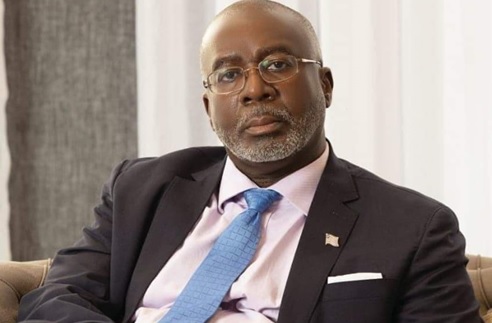By Sidiki Fofana
Truth In Ink
When political theater grows too elaborate for the public to follow, the true actors often operate behind the curtain. In the recent struggle over the Speaker’s gavel in Liberia’s House of Representatives, one man stood in the spotlight: Representative Musa H. Bility. But as the dust settles, many now believe the real story lies not just with him—but with the Executive Mansion itself.
Bility positioned himself as a defender of law and order when Speaker J. Fonati Koffa faced a controversial removal from office. He organized the Rule of Law Caucus, vowing to resist what many believed was an unconstitutional process. But behind that principled facade, questions began to emerge: Was Bility truly fighting for Koffa—or was it a calculated move to position himself for the speakership?
It is no secret that Bility has long desired the top job in the House. With Koffa in office, that ambition was effectively blocked.
Then came the opportunity.
Following what many considered an unconstitutional, rushed election, Representative Richard Koon was hastily installed as Speaker. Bility, who was left out of the process, immediately sprang into action. Rallying support under the banner of legality, he transformed Koffa’s legal resistance into a broader movement: the Rule of Law Caucus.
Publicly, the caucus claimed to defend constitutional order. But in practice, its actions paralyzed the House, delaying legislative business and plunging the country into political gridlock—all under the guise of legality. The deeper aim appeared to be to hold the institution hostage until it agreed to fresh elections—as indicated in its proposal submitted to former President Ellen Johnson Sirleaf, the chief negotiator. With new elections, Bility believed he could win.
“Legal arguments were weaponized for political ends,” said a senior constitutional lawyer who requested anonymity. “The Rule of Law Caucus claimed fidelity to constitutionalism, but its ultimate objective seemed more about timing a political transition than preserving legal order.”
That suspicion gained credibility when reports surfaced that Bility had, during the height of the standoff, lobbied Vice President Jeremiah Koung—widely believed to be a central player in Koffa’s removal—for support in a future speakership bid. That revelation raised a glaring contradiction: How could the loudest public critic of the process be privately preparing to benefit from it?
That duality was called out early by Kotati Kanga, known across social media as “Prominent Citizen.” In a widely circulated post, she accused Bility of playing what she called a “pawn game”—using Koffa’s resistance as political cover for his own ambitions.
Among Koffa’s staunch supporters, this interpretation is no longer fringe—it’s becoming consensus. To these supporters, the irony is striking: How can the Rule of Law Caucus, led by Representative Bility, so quickly abandon its supposed commitment to justice in the wake of a Supreme Court ruling that—while calling for a settlement and fresh elections—effectively legitimizes a process marred by duress, coercion, and procedural irregularities?
“These are not hallmarks of lawful conduct,” argued constitutional scholar Dr. Martha Nyanplu of the Louis Arthur Grimes School of Law. “They are symptoms of institutional capture—where legality is bent to serve political expedience. When the courts validate such outcomes, democracy pays the price.”
The only logical conclusion, amid various speculations of financial inducement, is that Bility now sees an opportunity to chase what he most desires: the speakership. And in his mind, this time, he believes he can win it.
But the blame hasn’t stopped with Bility. Within the Coalition for Democratic Change (CDC), finger-pointing abounds. Some blame Representative Thomas Fallah. Others accuse the party’s executive committee of failing to mount a meaningful defense of their own Speaker when it mattered most.
“CDC became a house divided,” said political analyst Jefferson Toe. “They allowed external forces to exploit their internal indecision—and now they’re paying the price.”
Still, these internal disputes may miss the true power behind the scenes: the Executive Branch.
Whether Bility used the impasse to launch a failed bid—he lost by just 17 votes—or the CDC simply failed to act, many now believe the ultimate orchestrator was President Joseph Boakai. The Executive’s invisible hand, with its sweeping control over appointments, funding, and influence, proved too strong to resist.
In Liberia’s political landscape, the presidency is not just a branch of government—it is the fulcrum. And Koffa’s fall, viewed through that lens, was less about party betrayal and more about presidential will. The House did not merely stumble into crisis. It was pushed.
So while it’s tempting to fixate on Bility’s maneuvering or the CDC’s inertia, which would be missing the forest for the trees. Koffa’s removal wasn’t the product of scattered political infighting—it was the result of deliberate executive calculation.
In the end, the question is no longer just whether Musa Bility used Koffa as a pawn. The real question is: Who was moving all the pieces?
And the answer, history may record, is not Bility, Fallah, or even the CDC—but President Joseph Boakai, whose Unity Party celebrated the rise of Richard Koon—a Unity Party member—as Speaker, bringing Koffa’s speakership to a definitive and orchestrated end.
About the Author:
Sidiki Fofana is an Organization and Leadership Development Expert with years of experience as a leader in Institutional Change Management and Business Development. He is a trained Cybersecurity Specialist from Saint Joseph University. A Grass Root Political Strategist.
He is the owner and a columnist for Truth In Ink Incorporated; His work focuses on political, economic and social analysis shaping ethics, power, and the evolving face of Liberian democracy.


